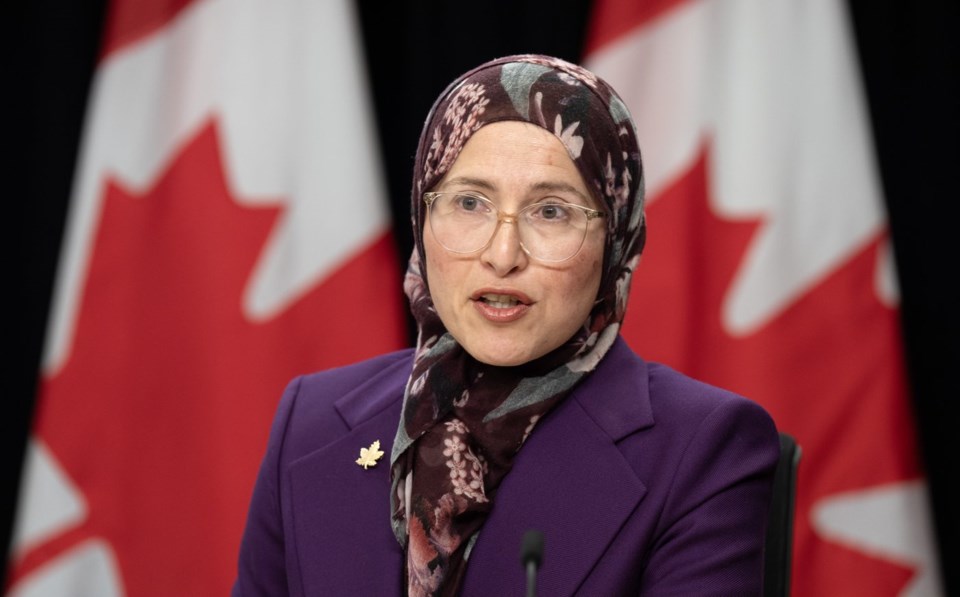OTTAWA — Ottawa's special representative on combating Islamophobia says she's alarmed by a recent revival of decades-old tropes about Muslims supporting terrorist violence.
Amira Elghawaby also said Canadians should not be reluctant to speak out for the rights of one group because of a fear of being accused of ignoring the plight of another.
"In a country as pluralistic and as diverse as Canada, we should be able to get this right," Elghawaby told The Canadian Press.
She said she's seen "extremely troubling" instances of people being maligned for peacefully expressing support for Palestinians and urging that Israel be held accountable for its restrictions on aid in Gaza and the high civilian death toll in the enclave.
"The same types of narratives that we had seen and we talked about post-9/11 have been resurfacing over the past two years," she said.
"We're constantly being viewed as engaging in, for example, what some politicians and columnists and media folks will call 'hate marches' when involved in any type of protests for Gaza."
She said that kind of commentary is a grim echo of widespread claims in 2001 that "Muslims are quintessential violent radicals, that they must be surveilled and disciplined by the state."
Elghawaby said police forces tell her that most of the protests on the war in Gaza take place without hate speech or calls for violence.
"There is consensus across the board that hate speech targeting any community — whether it's Muslims, whether it's Jewish people, whether it's Indigenous, any community at all — has to be taken fully seriously, with consequences meted out," she said.
"But the reality here is that it's wholly unfair to racially profile, to brand all people with the same accusations."
Elghawaby spoke to The Canadian Press after the sudden retirement this month of Deborah Lyons, Canada's special envoy on preserving Holocaust remembrance and combating antisemitism.
Lyons left her post early, saying she felt "despair" over of a growing gulf in Canadian society related to violence in the Middle East, and the failure of many Canadians to find common ground against hate.
Elghawaby said that she and Lyons worked to reinforce "the soul of Canada — a Canada where all of us, with all of our diversities, can belong and fulfil our fullest potential and feel safe to do so."
Elghawaby said she shares Lyons's fear that Canadians have "a sense of concern about appearing to be, for example, favouring one community over another."
She said fighting hate means advancing the shared principle that everyone in Canada should feel safe to express their faith or political views without retribution.
"We do have rules and policies, and we have a Charter of Rights and Freedoms, and we have human-rights codes that should help be our North Star on how we navigate a time of deep social challenge, when it comes to the rise of hate toward any community," she said.
But Elghawaby pushed back on Lyons's claim that some Muslims have been uneasy with seeing her work to combat anti-Jewish hate.
Lyons told the Canadian Jewish News that she and Elghawaby tried to work together to counter hate, and had plans to visit provincial education ministers together.
"Neither my community, nor her community, were happy all the time to see us in pictures together," Lyons said of Elghawaby.
Elghawaby said she's not aware of Muslims opposing any of her work against anti-Jewish hate.
"I have had no pushback on condemning antisemitism. I have had very good conversations with members of Canadian Jewish communities," she said.
Elghawaby said many Canadians' discomfort with confronting the reality on the ground in Gaza is making it impossible to engage in "good faith" dialogue about a path forward.
"Many Canadians of all backgrounds do believe that there is terrible oppression happening in Palestine, that there's an occupation," she said. "It's been described by human rights organizations as apartheid. Genocide scholars, and organizations have called what's happening now a genocide.
"If we are to have true dialogue, not being able to actually name the situation as it's being described ... by human-rights organizations and experts, it means that it's a discussion that can't be had in in fully good faith, because of the effort to almost make invisible or erase what various Canadians are seeing or describing for themselves."
While Elghawaby said she has no plans to quit before her term ends in February 2027, she acknowledged it's been "very, very sad and difficult" to see the rise in hate.
She said she told Prime Minister Mark Carney earlier this month that his goal of attracting the world's top talent requires ensuring everyone in Canada "feels supported, and that they are not going to be discriminated against and that their human rights will be protected."
"The reason this office exists is because members of our communities have been killed in this country because of Islamophobia," she said. "This is life-and-death for our communities."
This report by The Canadian Press was first published July 29, 2025.
Dylan Robertson, The Canadian Press




